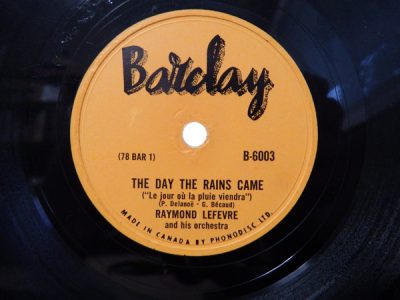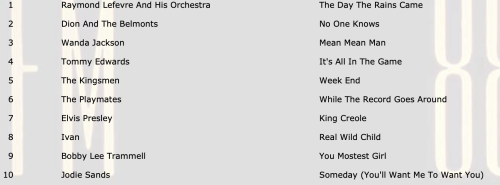#2: The Day The Rains Came by Raymond Lefevre
City: London, ON
Radio Station: CKSL
Peak Month: October 1958
Peak Position in London ~ #1
Peak position in Vancouver ~ #4
Peak Position on Billboard Hot 100 ~ #30
YouTube: “The Day The Rains Came”
Raymond Lefèvre was born in 1929 in Calais, France. He was accepted at the Paris Conservatory when he was 17 years old. During the early 1950s he played the piano for the Frank Pourcel Orchestra. In 1953 Lefèvre played the piano at the Hilton Hotel in Los Angeles. He started his musical career in 1956 on the Barclay label and recorded his debut album that year. In the 1950s he worked on the French television program Musicorama. and Palmarés des Chansons (1965, 1966, 1967) On these TV programs, he accompanied French recording artists Dalida, Claude François, Richard Anthony, and others, with his own orchestra.
In 1958, Raymond Lefèvre recorded an instrumental version of “The Day The Rains Came”.

“The Day the Rains Came” is a French song by Gilbert Becaud called “Le jour où la pluie viendra”. On the single release, Morgan sang the English version on one side and the French version – “Le Jour Ou La Pluie Viendra” – on the other. Pierre Delanoë was born in Paris in 1918, with his birth name Pierre Charles Marcel Napoléon Leroyer. He met Gilbert Bécaud after World War II, and the pair sang in clubs in the beginning. They shifted to Delanoë writing lyrics and Bécaud composing music. The songwriting team wrote “Et maintenant”, a hit in France which was equally a hit in English, translated as “What Now My Love”. In 1955 the pair composed “Je t’appartiens”, which was translated in English as “Let It Be Me” – a hit for both the Everly Brothers, and later Betty Everett and Jerry Butler.
Among his many compositions, Delanoë wrote “La Goualante du pauvre jean”, which Edith Piaf recorded in 1954. And in 1958 he co-wrote the winner of the Eurovision Song Contest – “Dors, mon amour” (“Sleep, My Love”). He died at the age of 88 in 2006.
Gilbert Bécaud was born in 1927 in the French Riviera city of Toulon. Learning piano during his childhood, he had further studies in music at the Conservatoire de Nice. But he left school to join the French Resistance during World War II. Among his other compositions is “Seul sur son étoile”, which was translated in English as “It Must Be Him”, a #3 hit for Vicki Carr in 1967. He recorded a number of operas, and released over twenty studio albums between 1953 and 1999. As well, he was cast in a half a dozen films. Bécaud died at the age of 71 of lung cancer in 2001.
Composer of the English lyric “The Day The Rains Came” is Carl Sigman. He was born in 1909 in Brooklyn. In the 1940s he co-wrote “Pennsylvania 6-5000” for Glenn Miller, and “Crazy He Calls Me” for Billie Holiday in 1949. The song was covered by Dinah Washington, Anita O’Day and many others. In 1957 he wrote the English lyrics for “Till”, derived from the French song “Prière Sans Espoir”. And in 1961 Sigman wrote the English translation for “Et maintenant”, which was rendered “What Now My Love?” Sigman also wrote the Christmas tune “A Marshmallow World”; Vaughan Monroe’s number one hit in 1947, “Ballerina”; a number one hit in 1949 for Mel Tormé titled “Careless Hands”; “Civilization” by the Andrews Sisters and Danny Kaye; “Ebb Tide” for Vic Damone; “It’s All In The Game” for Tommy Edwards in 1951 and a number-one hit in 1958; “Shangri-La” for the Four Coins and “(Where Do I Begin?) Love Story” for Andy Williams in 1970. Sigman died at the age of 91 in 2000.
French pop singer, Dalida, recorded “Le Jour où la pluie viendra” in 1957. It climbed to #3 in Belgium, France, and Spain later that year. In 1959, a German adaptation by Dalida – “Am Tag Als Der Regen Kam” – peaked at #1 in West Germany. In French, in addition to Dalida, the song has been recorded by Les Compagnons de la chanson, Guylaine Guy, Nicole Félix, Jane Morgan, Aïda Aznavour, Claude Luter, Jean Bertola, and Philippe Andrey. In Italian, as “La pioggia cadrà” with lyrics by Mario Panzeri, it has been recorded by Betty Curtis, Anita Traversi, Toorrebruno, Dalida, and Nilla Pizzi.
“The Day The Rains Came” is a song using rainfall, and what it provides nature, as a simile for the blossoming of young love. Now lilacs can bloom, fields can grow greener. In response to the rainfall, willow trees reach their branches up to the sky, robins sing, mountain streams rush to overflowing. Dry river beds are gone, so too, are dusty valleys. And so too are dusty and dry hearts replenished with “love sweet love.” The natural world offers a promising horizon: “Love sweet love, rain sweet rain.”
Raymond Lefèvre’s instrumental of “The Day The Rains Came” peaked at #1 in London (ON), #2 in San Francisco, #3 in Salt Lake City, #4 in Toronto, Seattle, and Vancouver (BC), #5 in Boston, and Las Vegas, and #7 in Chicago.
Jane Morgan‘s English-language version titled “The Day The Rains Came” peaked at #1 in the UK, #4 in Canada and #7 in Norway. In North American, Morgan’s release climbed to #1 in Manchester (NH) and Hull (PQ), #3 in Burlington (VT), #4 in Vancouver (BC), La Grange (IL), and Toronto, #5 in Buffalo, Los Angeles and Las Vegas, #6 in Norfolk (VA) and Denver, #7 in Janesville (WI), Ottawa (ON), and Chicago, #8 in Pittsburgh, and #9 in Dearborn (MI).
Lefèvre’s “Ame câline” (Soul Coaxing)” became an international hit in 1968, peaking at #37 on the Billboard Hot 100. While “La La La (He Gives Me Love)” – an instrumental adaptation of 1968’s Eurovision Song Contest’s winning song by Spanish singer Massiel – was a minor hit in 1968 peaking in the Top 30 on Adult Contemporary charts. In 1969, his recording of “La Reine de Saba” (Queen of Sheba) became a big hit in Japan. He also released instrumental single covers of “Spanish Eyes”, “Groovin'”, “Whiter Shade of Pale”, “Delilah” and “Mammy Blue”.
From 1972 until the early 2000s, he undertook several successful tours of Japan. Lefèvre conducted entries four times at the Eurovision Song Contest, three of these in Monaco (in 1961, 1962 and 1963) and once for the 1970 contest in Luxembourg. During his career, the orchestra leader released over ninety studio albums.
Over the decades, worked on the soundtracks for many films by Louis de Funès. Raymond Lefèvre died in 2008 at the age of 78.
June 25, 2025
Ray McGinnis
References:
Pierre Perrone, “Raymond Lefevre: Maestro of easy listening,” The Independent, July 22, 2008.
Douglas Martin, “Carl Sigman, 91, Songsmith Who Made Generations Hum,” New York Times, September 30, 2000.
“Pierre Delanoë,” Wikipedia.org.
“Gilbert Bécaud,” Wikipedia.org.
Dalida, “Le Jour où la pluie viendra“, Barclay, 1957.
Dalida, “Am Tag Als Der Regen Kam“, Barclay, 1959.
Betty Curtis, “La pioggia cadrà“, CGD, 1958.
Jean-Claude Pascal, “Nous les amoureux” 1961 (Eurovision Song Contest winner from Luxembourg, conducted by Raymond Lefèvre Orchestra).
Isabelle Aubret, “Un premier amour” 1962 (Eurovision Song Contest winner from France, conducted by Raymond Lefèvre Orchestra).
Alain Barrière, “Elle était si jolie“, 1963 (Eurovision Song Contest winner from France, conducted by Raymond Lefèvre Orchestra).
Dana, “All Kinds of Everything“, 1970 (Eurovision Song Contest winner from Ireland, conducted by Raymond Lefèvre Orchestra).

CKSL 1410-AM London (ON) Top Ten | October 11, 1958

Leave a Reply